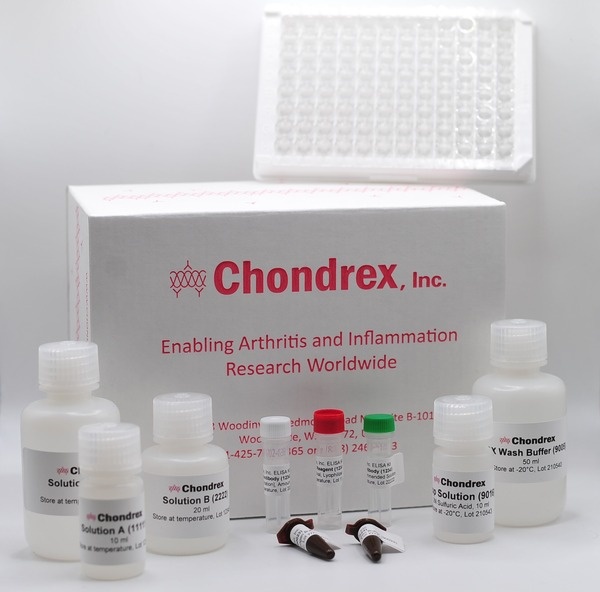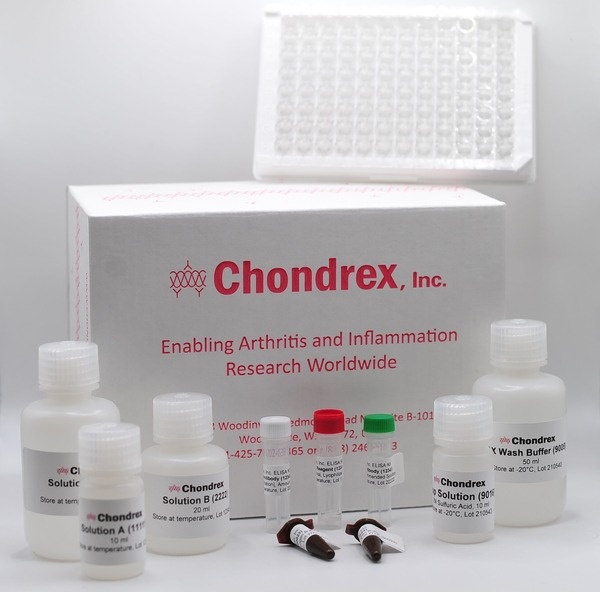Human anti-type V collagen IgG antibody assay kits are available for studying the possible involvement of type V collagen immunity in organ allograft rejection for both in vitro and in vivo experiments. In order to determine human serum antibodies that exhibit a significant diversity in antigen specificity, Chondrex, Inc. manufactures various species of type V collagen-coated ELISA plates in addition to uncoated wells for use as a blank.
Human Anti-Type V Collagen Antibody Assay Kit
NOTE: Amnion type V collagen: [alpha1(V)]2 alpha2(V)
Placenta type V collagen: mixture of [alpha1(V)]2 alpha2(V) and alpha1(V) alpha2(V) alpha3(V)
In this series of Human Anti-Collagen Antibody Assay Kits, one standard is commonly used for comparing antibody levels to individual species and types of collagen, and for analyzing the diversity of antibody specificity for different samples in various studies. These ELISA kits contain enough materials to run two plates on two separate occasions and may be used for monkey sera, as well as human sera. Customized kits to measure antibody levels to various types and species of collagen can be also be ordered. Please contact us for more information about ordering these custom kits.
Type V Collagen and Organ Allograft Rejection
Humans are exposed to an immeasurable number of antigens throughout their lifetime. As a result, human sera contain antibodies against a variety of antigens including a various species and types of collagen contained in the diet, regardless of diseases. For example, sera even from healthy normal controls contain antibodies against various species and types of collagen. These antibodies are specific to heterologous collagen, but often cross-react to autologous collagen due to the highly conserved amino acid sequences of collagen, and may play an important role as autoantibodies in the pathogenesis of autoimmune diseases and allograft rejection.
For instance, immune reactions to type V collagen may play a role in graft rejection following lung transplant. It has been reported that patients who were previously sensitized by type V collagen and positive for type V collagen-delayed-type hypersensitivity (DTH) reaction tend to develop idiopathic pulmonary fibrosis (58.8%, 10/17) compared to patients who were negative for the DTH reaction (15.8%, 6/38).
Prevalence of Antibody to Type V Collagen in Normal Controls and Patients with Rheumatoid Arthritis
Serum samples from 21 normal controls and 21 patients with RA were assayed for antibodies against bovine type I, II, and V collagen, as well as human type V collagen. As shown in Figure 1, antibodies to bovine type V collagen (more than 50 units/ml) were determined in four (4/21) normal controls and in eight (8/21) patients with RA, but antibodies cross-reacting to human type V collagen were determined only in one (1/21) RA patients. On the other hand, antibodies to bovine type I and II collagen were commonly observed in both normal controls (9/21 and 14/21), and patients with RA (9/21 and 10/21).

Figure 1 - Prevalence and antibody levels to bovine type I, II and V collagen and human type V collagen in normal controls and patients with RA
Abbreviations: BI: Bovine type I collagen, BII: Bovine type II collagen, BV: Bovine type V collagen (amnion), HV: Human type V collagen (amnion), NL: Normal, RA: Rheumatoid arthritis


